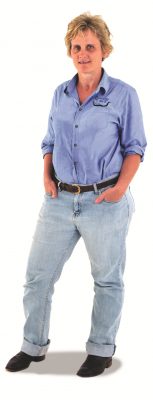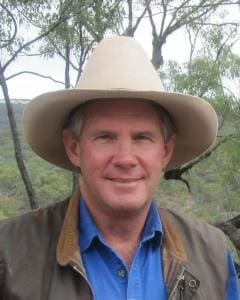A long-serving cattle veterinarian has outlined six reasons why she believes Queensland should not change legislation to permit non-veterinarians to pregnancy test cattle, as is allowed by the Northern Territory and Western Australia.
Queensland cattle producer representative body AgForce has been campaigning for several years for the Queensland Government to amend the State’s Veterinary Services Act 1936 to allow pregnancy testing by accredited non-veterinarians.
AgForce argues pregnancy testing is an essential component of herd management to maintain high fertility rates, but relying on veterinarians to do the work within required time frames can be difficult and expensive. It says the current vet-only restruction places Queensland producers at a competitive disadvantage to producers in other states and territories.
The Queensland Government is asking all stakeholders to have a say on the issue by November 30, before it makes a decision.
Dr Sandi Jephcott, based at Surat in Southern Queensland, has had extensive experience as a veterinarian and educator in the beef cattle industry, both in Australia and overseas.
In a written submission she has outlined six reasons why she believes the status quo should remain around pregnancy testing regulations in Queensland:
Employment: “In the last 10 or so years Australian veterinary schools have increased from four (Brisbane, Sydney, Melbourne and Perth) to seven (Brisbane, Townville, Sydney, Wagga Wagga, Melbourne, Roseworthy and Perth).
“Class sizes have also increased so this has more than doubled the number of graduating veterinarians with a HECS debt that need to find work”.
Biosecurity: “Also over the last 10 years, DAF resources in rural Queensland have significantly diminished, including employment of veterinarians, so it is vital that private veterinarians continue to visit cattle properties to observe the heath of livestock.
“Producers are not going to request veterinarians to visit a property for biosecurity reasons so jobs such as pregnancy testing and bull testing will encourage producers to get veterinarians to come onto the property.
“Maintaining biosecurity is vital for our predominantly export market for our beef.”
Skills: “Veterinarians have a range of skills so they are not just testing for empty or pregnant, they can pick up on any reproductive disease issues, abnormalities, abnormal conception patterns, general health of the livestock etc.
“They can discuss with the producer disease prevention measures, nutrition, management issues etc.”
Maintaining services in rural communities: “For some rural veterinarians, pregnancy testing determines whether they maintain a clinic in a rural town. If the vet leaves town, citizens with dogs, cats, horses and other animals will have a long way to travel.”
Preg testing their own cattle: For producers living remotely without easy access to veterinarians, the law only says they cannot pregnancy test for fee or reward, therefore they can test their own cattle.
Animal welfare: “Veterinarians are trained to respect animals and minimise injury and stress.
“I am a beef cattle veterinarian and have pregnancy tested nearly two million cattle throughout remote Australia. I was pregnancy testing some cattle on a remote cattle station in Northern Territory. These cows had come from Queensland and had been pregnancy tested by a lay person. One cow had died on the truck coming up and one had died on arrival in NT.
“When I tested the others, about 10 percent of them had a ruptured rectum and adhesion between the omentum, gut, and rectal wall to bridge the penetration.
“These cows survived but they would never breed again and the pregnant ones had to be sold for slaughter as they would have died calving. Access to ultrasound makes untrained people more dangerous.”
Dr Jephcott said that if the Queensland Government was to allow lay pregnancy testing in the State, it would have to ensure lay pregnancy testers receive adequate training, in her view comprising at least a Cert IV qualification from an agricultural college in pregnancy testing.
“This course should be developed before it goes ahead,” she said.
“This is absolutely essential so testers can take out professional indemnity insurance in case they injure themselves or one of their client’s animals or a person helping them.
“It is vital for the welfare of the animal and the QA for the service.”
She suggested vet schools should coordinate with ag colleges to conduct Cert IV training as vet schools do not have a lot of access to land and cattle for training their students.
Nor should there be n ‘us versus them’ attitude, she said.
“Vets and lay preg testers should work in with each other in a community if this goes ahead,” she said.
“Lay preg testers should only be able to operate where there is not a capable beef cattle veterinarian within 200km of a cattle property.”
AgForce: This is not about reducing standards
AgForce Cattle President Bim Struss is urging Queensland cattle producers to provide their feedback to the Queensland Government consultation process.
He stressed that the move was not about taking away business from vets or reducing standards.
“It is about ensuring there is increased access to reliable and cost-effective pregnancy testing across Queensland.”
“We have been and will continue to work with the Australian Vet Association, the Cattle Vet Association and the RSPCA to ensure the program meets expectations and the highest standards of animal welfare are achieved.
“Just as we have done with the more invasive dropped ovary spaying surgical procedure which can be legally carried out in Queensland by a lay person.
“We want to have this new professional accreditation scheme in place before the herd returns to normal levels by 2020/2021 so producers can take full advantage and our industry can continue to grow strongly.”
Mr Struss said that’s why AgForce has recommended the Veterinary Surgeons Act 1936 be amended to enable non-vets to practice pregnancy testing, and to allow more testing to be done via ultrasound technology.
“In conjunction with the AVA, we are looking to develop a high level, sustainable system to accredit lay persons based on the principles established in the PREgCHECK program.”
Producers can provide comment by completing a ten-minute survey anonymously at https://bit.ly/2yN4bqq, by emailing bioseclegislation@daf.qld.gov.au or by mailing to GPO Box 46, Brisbane, 4001 before 14 December 2018.


